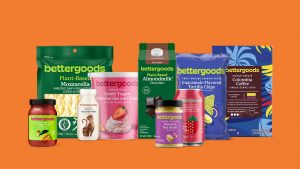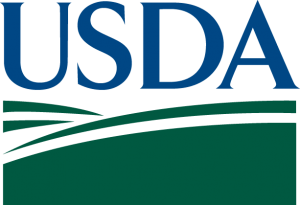Walmart Launches bettergoods Private Brand Line
 As part of Walmart’s mission to make quality, great tasting food accessible for customers, the retailer launched its latest private brand innovation, bettergoods: a new elevated experience that delivers quality, unique, chef-inspired food at an incredible value.
As part of Walmart’s mission to make quality, great tasting food accessible for customers, the retailer launched its latest private brand innovation, bettergoods: a new elevated experience that delivers quality, unique, chef-inspired food at an incredible value.
Bettergoods marks Walmart’s largest private brand food launch in 20 years and the fastest food private brand Walmart has brought to market, highlighting the speed with which Walmart can bring trend and innovation to market at scale.
“Today’s customers expect more from the private brands they purchase – they want affordable, quality products to elevate their overall food experience. The launch of bettergoods delivers on that customer need in a meaningful way,” said Scott Morris, senior vice president, private brands, food and consumables, Walmart. “Bettergoods is more than just a new private brand. It’s a commitment to our customers that they can enjoy unique culinary flavors at the incredible value Walmart delivers.”
Bettergoods joins Walmart’s impressive roster of innovative private brands that bring customers quality products at an amazing value, offering a brand-new, fresh take on the culinary experience with elevated taste, flavor and variety that’s approachable and – most importantly – affordable. Thoughtfully curated by Walmart’s experienced product development team that collaborated with suppliers across the globe to source quality, trend-forward ingredients and flavors, bettergoods brings exciting culinary concepts directly to customers at Walmart’s Every Day Low Prices.
Unlike many private brands that provide direct alternatives to national brand offerings at a lower price, many bettergoods items are totally unique to Walmart, introducing customers to new and exciting flavors and concepts. And Walmart customers can expand their culinary horizons with confidence: Bettergoods products are satisfaction guaranteed – one more way Walmart is committed to providing an exceptional experience for its customers.
Bettergoods items range from under $2 to under $15, with most products available for under $5. Bettergoods is designed to delight, with 300 items spanning Walmart’s aisles, including frozen, dairy, snacks, beverages, pasta, soups, coffee, chocolate and more. Bettergoods items fall within three distinct category pillars:
- Culinary experiences: Culinary experiences items spotlight innovative recipes, elevated ingredients and food-trend forward offerings, including specialty salts and seasonings, like Hot Honey Seasoning at an amazing value under $3, a line of jar soups, including our Creamy Corn Jalapeno Chowder for under $4 and premium Bronze Cut Pasta from Italy for only $1.97.
- Plant-based: These products feature distinct green branding and big flavors made to be devoured. Bettergoods plant-based items provide an exceptional eating experience including decadent and smooth Oatmilk Non-Dairy Frozen Desserts customers won’t believe are plant-based for only $3.44 a pint, as well as a plant-based cheese alternative which has an incredible cheesy pull when melted for under $4.
- “Made Without”: The Made Without pillar offers a broad variety of options that cater to different dietary lifestyles, like gluten free, or made without artificial flavors, colorings or added sugars. While these items are made without certain ingredients, they don’t lack flavor or texture, like Sweet Cream Dairy Creamer, made using only four ingredients, gluten free, antibiotic free, all white meat chicken nuggets and our Carnitas, Taco or Tinga Seasonings for under $2.
Tasting is believing, and customers can shop select bettergoods products now, in stores and on Walmart.com for curbside pickup and same day delivery, with the full line continuing to roll out over the coming months. With bettergoods, Walmart is continuing its mission to democratize access to quality, delicious and innovative foods that customers crave at the Every Day Low Price Walmart delivers.
For more news of interest to the grocery industry, subscribe to Gourmet News.
Rob Walton to Retire From Walmart Board; Chipotle’s Niccol Nominated
 Rob Walton will retire from the Walmart board of directors at the conclusion of his current term on June 5. Walton joined Walmart in 1969 and before that worked alongside his father, Sam, in his 5&10 store. He served more than 40 years on the Walmart Board and helped shape some of the most important moments in Walmart history.
Rob Walton will retire from the Walmart board of directors at the conclusion of his current term on June 5. Walton joined Walmart in 1969 and before that worked alongside his father, Sam, in his 5&10 store. He served more than 40 years on the Walmart Board and helped shape some of the most important moments in Walmart history.
“Walmart is the world’s leading omni-channel retailer,” said Greg Penner, chairman. “That’s a credit to our team today and to those who, over decades, helped to build and shape our company. One of those incredible leaders is Rob Walton, my father-in-law, who recently shared his decision not to seek re-election to our board of Ddrectors.
“His leadership has been critical as we’ve grown our business over so many years. There’s no doubt Sam would be very proud. On behalf of our associates and the board, I’d like to thank him for his unparalleled and amazing service.”
Walton served as Walmart’s chairman of the board of directors from 1992 to 2015.
Walton joined the company in 1969. Prior to becoming chairman, he held a variety of positions with Walmart, including senior vice president, corporate secretary, general counsel and vice chairman. Before joining Walmart, Walton was a partner with the law firm of Conner & Winters in Tulsa, Okla.
He is involved with a number of nonprofit and educational organizations, including Conservation International, where he serves as chairman of the executive committee, and the College of Wooster, where he is an emeritus life trustee.
Brian Niccol, chairman and CEO of Chipotle Mexican Grill, Inc., has been nominated to replace Walton on the board.
Prior to joining Chipotle in 2018, Niccol served as CEO of Yum! Brands’ Taco Bell Division, where he was responsible for the highly successful turnaround of the business. He served as Taco Bell CEO from January 2015 and president from 2013 to 2014. Under his leadership, he successfully repositioned Taco Bell as a lifestyle brand and successfully launched numerous product initiatives, including the new breakfast daypart, the fastest growing daypart in the industry. He transformed Taco Bell into a social media leader and revolutionized its digital approach through mobile ordering and payment across their 7,000 restaurants. He also created a people-centric innovation culture that has been recognized throughout the industry.
Prior to Taco Bell, Niccol held leadership roles at Pizza Hut, including vice president of strategy, chief marketing officer, and general manager. He led the brand strategy and positioning that achieved record transactions and market share. Additionally, his innovation in digital with on-line and mobile app ordering was industry leading during his time in the business.
Niccol began his career at Procter & Gamble where he spent 10 years in various brand management positions. He holds an undergraduate degree from Miami University (OH) and an MBA from The University of Chicago Booth School of Business. Niccol serves on the board of governors for the Boys & Girls Club of America and on the board of directors of Harley-Davidson, Inc.
For more news of interest to the grocery industry, subscribe to Gourmet News.
USDA Finalizes Policy on Declaring Salmonella in Raw Breaded Stuffed Chicken Products
 The U.S. Department of Agriculture’s Food Safety and Inspection Service has made its final determination to declare Salmonella an adulterant in raw breaded stuffed chicken products when they exceed a specific threshold (1 colony forming unit per gram or higher) for Salmonella contamination.
The U.S. Department of Agriculture’s Food Safety and Inspection Service has made its final determination to declare Salmonella an adulterant in raw breaded stuffed chicken products when they exceed a specific threshold (1 colony forming unit per gram or higher) for Salmonella contamination.
This final determination is part of FSIS’ broader efforts to reduce Salmonella illnesses associated with the raw poultry supply in the United States. FSIS intends to address Salmonella contamination in other raw poultry products later this year.
“Under President Biden’s leadership, USDA is taking significant steps toward keeping American consumers safe from foodborne illness,” said Agriculture Secretary Tom Vilsack. “This final determination marks the first time that Salmonella is being declared an adulterant in a class of raw poultry products. This policy change is important because it will allow us to stop the sale of these products when we find levels of Salmonella contamination that could make people sick.”
Under this determination, FSIS will consider to be adulterated any raw breaded stuffed chicken products that include a chicken component that tested positive for Salmonella at 1 CFU per gram or higher.
FSIS will carry out verification procedures, including sampling and testing of the raw incoming chicken component of these products prior to stuffing and breading, to ensure producing establishments control Salmonella in these products. If the chicken component in these products does not meet this standard, the product lot represented by the sampled component would not be permitted to be used to produce the final raw breaded stuffed chicken products. The determination, including FSIS’ sampling and verification testing, will be effective 12 months after its publication in the Federal Register.
In determining that Salmonella is an adulterant in raw breaded stuffed chicken products, FSIS considered the best available science and data using similar criteria as in its 1994, 1999, and 2011 E. coli policymaking. When FSIS declared seven Shiga toxin-producing Escherichia coli strains to be adulterants in select raw beef products, it relied on several factors, including the available information on serotypes linked to human illnesses, infectious dose, severity of illnesses and typical consumer preparation practices associated with a product. The breaded stuffed chicken products determination relied on the same factors.
FSIS and its public health partners have investigated 14 Salmonella outbreaks and approximately 200 illnesses associated with these products since 1998. The most recent outbreak was in 2021 and resulted in illnesses across 11 states. These products account for less than 0.15% of the total domestic chicken supply, but outbreaks linked to these products represented approximately 5% of all chicken-associated outbreaks in the U.S. during 1998-2020.
Raw breaded stuffed chicken products are pre-browned and may appear cooked, but the chicken is raw. The products are typically cooked by consumers from a frozen state, which increases the risk of the product not reaching the internal temperature needed to destroy Salmonella. Despite FSIS’ and industry’s efforts to improve labeling, these products continue to be associated with Salmonella illness outbreaks.
The Centers for Disease Control and Prevention estimates that Salmonella bacteria cause over 1 million human infections in the United States each year. Food is the leading source of Salmonella infections and poultry products are one of the leading sources of foodborne Salmonella illnesses.
FSIS will continue to evaluate and, if necessary, refine its policies and standards related to the oversight of raw breaded stuffed chicken products as advances in science and technology related to pathogen levels, serotypes, laboratory methods and infectious dose become available.
This final determination builds on USDA’s continued efforts under the Biden-Harris Administration to protect American consumers, whether to ensure food safety or prevent false and misleading label claims. Earlier this year, USDA published a final rule allowing the voluntary “Product of USA” claim to be applied only to those FSIS-regulated products that are derived from animals born, raised, slaughtered and processed in the United States. USDA is currently re-evaluating the FSIS guideline for animal-raising claims to better ensure that they are adequately substantiated.
To view the final determination, visit the FSIS Federal Register Rules webpage.
For more news of interest to the poultry industry, subscribe to Gourmet News.






